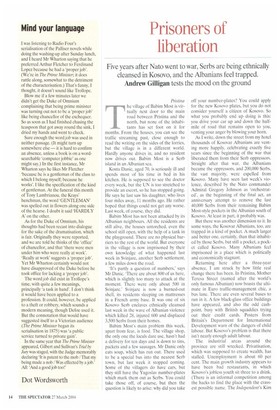Mind your language
I was listening to Radio Four's serialisation of the Palliser novels while doing the washing-up after Sunday lunch, and I heard Mr Wharton saying that he preferred Arthur Fletcher to Ferdinand Lopez because he had a 'proper job'. (We're in The Prime Minister, it does rattle along, somewhat to the detriment of the characterisation.) That's funny, I thought, it doesn't sound like Trollope.
Blow me if a few minutes later we didn't get the Duke of Omnium complaining that being prime minister was turning out not to be a 'proper job' like being chancellor of the exchequer. So as soon as I had finished chasing the teaspoon that got away round the sink, I dried my hands and went to check.
Sure enough the word job was used in neither passage. (It might turn up somewhere else — it is hard to confirm an absence, unless a book is on a wordsearchable 'computer jobbie' as one might say.) In the first instance, Mr Wharton says he likes Mr Fletcher 'because he is a gentleman of the class to which I belong myself; because he works'. I like the specification of the kind of gentleman. At the funeral this month of Tony Larnbrianou, the Krays' henchman, the word 'GENTLEMAN' was spelled out in flowers along one side of the hearse. I doubt it said 'HARDLY A' on the other.
As for the Duke of Omnium, his thoughts had been recast into dialogue for the sake of the dramatisation, which is fair. Originally they were reported, and we are told he thinks of the 'office' of chancellor, and that 'there were men under him who were really at work'. 'Really at work' suggests a 'proper job'. Yet Mr Wharton certainly would not have disapproved of the Duke before he took office for lacking a 'proper job'.
The word job did exist in Trollope's time, with quite a few meanings, principally 'a task in hand'. I don't think it would have been applied to a profession. It could, however, be applied to a theft or robbery, which sounds a modern meaning, though Defoe used it. But the connotation that would have suggested itself to a Victorian audience (The Prime Minister began its serialisation in 1875) was 'a public service turned to private gain'.
In the same year that The Prime Minister appeared, Gilbert and Sullivan's Trial by Juty was staged, with the Judge memorably declaring 'It is patent to the mob / That my being made a nob / Was effected by a job.' All: 'And a good job toot'


























































































 Previous page
Previous page